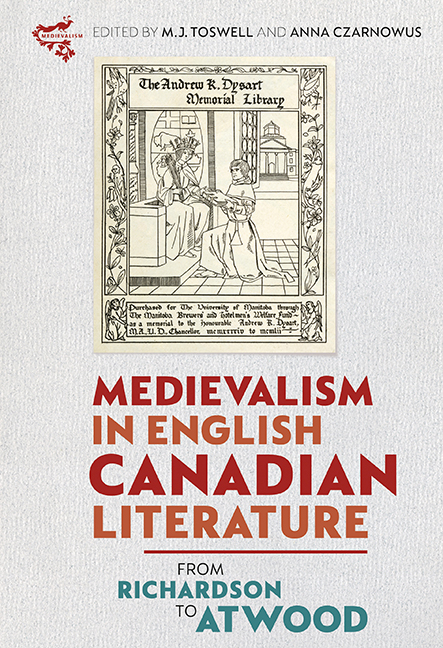Book contents
- Frontmatter
- Contents
- Introduction: English Canadian Medievalism
- 1 “Men of the North”: Archibald Lampman's Use of Incidents in the Lives of Medieval Monarchs and Aristocrats
- 2 “Going Back to the Middle Ages”: Tracing Medievalism in Julia Beckwith Hart's St. Ursula's Convent and John Richardson's Wacousta
- 3 John Richardson's Wacousta and the Transfer of Medievalist Romance
- 4 A Canadian Caliban in King Arthur's Court: Materialist Medievalism and Northern Gothic in William Wilfred Campbell's Mordred
- 5 Orientalist Medievalism in Early Canadian Periodicals
- 6 The Collegiate Gothic: Legitimacy and Inheritance in Robertson Davies's The Rebel Angels
- 7 Earle Birney as Public Poet: a Canadian Chaucer?
- 8 “That's what you get for being food”: Margaret Atwood's Symbolic Cannibalism 129
- 9 Lost in Allegory: Grief and Chivalry in Kit Pearson's A Perfect, Gentle Knight
- 10 Remembering the Romance: Medievalist Romance in Fantasy Fiction by Guy Gavriel Kay and Charles de Lint
- 11 Medievalisms and Romance Traditions in Guy Gavriel Kay's Ysabel
- 12 The Medieval Methods of Patrick DeWitt: Undermajordomo Minor
- Index
- Miscellaneous Endmatter
9 - Lost in Allegory: Grief and Chivalry in Kit Pearson's A Perfect, Gentle Knight
Published online by Cambridge University Press: 25 March 2020
- Frontmatter
- Contents
- Introduction: English Canadian Medievalism
- 1 “Men of the North”: Archibald Lampman's Use of Incidents in the Lives of Medieval Monarchs and Aristocrats
- 2 “Going Back to the Middle Ages”: Tracing Medievalism in Julia Beckwith Hart's St. Ursula's Convent and John Richardson's Wacousta
- 3 John Richardson's Wacousta and the Transfer of Medievalist Romance
- 4 A Canadian Caliban in King Arthur's Court: Materialist Medievalism and Northern Gothic in William Wilfred Campbell's Mordred
- 5 Orientalist Medievalism in Early Canadian Periodicals
- 6 The Collegiate Gothic: Legitimacy and Inheritance in Robertson Davies's The Rebel Angels
- 7 Earle Birney as Public Poet: a Canadian Chaucer?
- 8 “That's what you get for being food”: Margaret Atwood's Symbolic Cannibalism 129
- 9 Lost in Allegory: Grief and Chivalry in Kit Pearson's A Perfect, Gentle Knight
- 10 Remembering the Romance: Medievalist Romance in Fantasy Fiction by Guy Gavriel Kay and Charles de Lint
- 11 Medievalisms and Romance Traditions in Guy Gavriel Kay's Ysabel
- 12 The Medieval Methods of Patrick DeWitt: Undermajordomo Minor
- Index
- Miscellaneous Endmatter
Summary
IN KIT PEARSON'S 2007 novel A Perfect, Gentle Knight, a family reacts to the death of their mother, and the benevolent neglect of their father, by playacting as the Knights of the Round Table. Led by the eldest brother Sebastian, who adopts the identity of Sir Lancelot, the siblings find their game taking over their lives. Sebastian, also suffering from bullying at school, increasingly loses himself in his chivalric identity. In Pearson's Young Adult novel, set in late 1950s Vancouver, Sebastian's allegorical approach to the world threatens to separate him from it completely. While the novel spends time on the motifs and characters of the Round Table tradition, the title hints at another connection: Chaucer's pilgrim Knight and his son, the Squire. Despite its Canadian setting and the nationality of its author, this book suggests that Canadian medievalism is as yet undefined, outside of being something with its origins rooted in the medievalism of its British parent but inflected by that of its American cousin. Like Sebastian’s, Canada's medievalism – like so much of its identity – is a kind of (sometimes uncomfortable) hybrid.
A Perfect, Gentle Knight follows the Bell family, six children and their widower father William, recovering from the death of their mother and spouse. Sebastian, the oldest, runs the household with the help of his next two siblings, sisters Rosalind (Roz) and Cordelia (Corrie); they are followed by Harry and twins, Juliet and Orlando (Orly). Bullied at school, Sebastian sees his home life as a refuge; the reader is told that he keeps his hair in a way that makes him resemble Prince Valiant (40), which attracts trouble in a 1957 school. While they have an inadequate housekeeper, latest in a series, Sebastian refuses to allow his siblings to complain to their father, called Fa, lest he replace her with someone who will pay attention to what they do. The leading candidate is their paternal aunt, Madge, currently acting as a caregiver for a cousin in Winnipeg. Sebastian has a degree of independence that he does not want threatened, and part of that independence is built around what we would now call a roleplaying game: they pretend to be members of King Arthur's court at Camelot.
- Type
- Chapter
- Information
- Medievalism in English Canadian LiteratureFrom Richardson to Atwood, pp. 143 - 154Publisher: Boydell & BrewerPrint publication year: 2020



